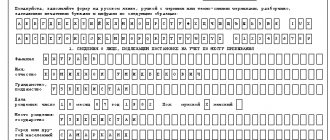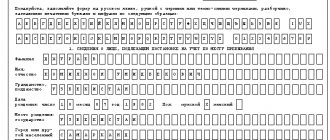Registration of obviously illegal transactions with real estate, deliberate distortion of information from the state real estate cadastre and (or) the Unified State Register of Rights to Real Estate and Transactions with It, as well as understatement of the cadastral value of real estate, if these acts were committed out of selfish or other personal interest by an official using his official position, -
shall be punishable by a fine in the amount of two hundred thousand to five hundred thousand rubles, or in the amount of the wages or other income of the convicted person for a period of one to three years, or by deprivation of the right to hold certain positions or engage in certain activities for a term of up to three years, or by compulsory labor for a term up to three hundred and sixty hours with deprivation of the right to hold certain positions or engage in certain activities for a period of up to three years.
- Article 169. Obstruction of legal business or other activities
- Article 170.1. Falsification of the unified state register of legal entities, the register of securities owners or the depository accounting system
Qualification Features
The peculiarity of the qualification of crimes under Art. 170 of the Criminal Code of the Russian Federation, experts name the characteristics of their object . Since the subject of land relations, which are protected by this criminal law norm, is land (land plots), there is an opinion that the object of such crimes is land or land plots.
At the same time, if we analyze the elements of a crime, the object on which the offender influences is considered not the site, but the document in which incorrect entries are made. When registering illegal transactions with land, such a document is the Unified State Register for real estate.
When an attacker distorts the credentials of the State Land Cadastre, the subject of the crime is the State Real Estate Cadastre.
Table Structure of the Real Estate Cadastre and Unified State Register
| Structure of the real estate cadastre | Structure of the Unified State Register of Rights |
| A register of real estate objects, i.e. an ordered list of records about objects in printed form by describing the entered data about them. | Register of real estate objects (real estate cadastre). |
| Cadastral files, consisting of a set of compiled and systematized files, on the basis of which civil registration records are made. | Register of rights, restrictions on rights and encumbrances of real estate (registry of rights to real estate). |
Cadastral maps, which are thematic maps compiled on a unified cartographic basis, on which information entered into the state real estate cadastre on:
| Register of information about:
|
| Registry matters. | |
| Cadastral maps. | |
| Books of documents. |
When an official deliberately underestimates the amount of payments for land, the subject of the crime is settlement documents for payment of land tax or rent.
In what cases can a real estate transaction be challenged?
1. GENERAL PROVISIONS
1.1. This Privacy Policy regarding the processing of personal data of users of the site https://www.dvitex.ru/ (hereinafter referred to as the Privacy Policy) was developed and applied by Legal LLC, OGRN 1107746800490, Moscow, per. Golutvinsky 1st, building 3-5, office 4-1 (hereinafter referred to as the Operator) in accordance with paragraphs. 2 hours 1 tbsp. 18.1 of the Federal Law of July 27, 2006 No. 152-FZ “On Personal Data” (hereinafter referred to as the Law on Personal Data).
1.2. This Privacy Policy defines the Operator’s policy regarding the processing of personal data accepted for processing, the procedure and conditions for the processing of personal data of individuals who have transferred their personal data for processing to the Operator (hereinafter referred to as personal data subjects) with and without the use of automation tools, establishes procedures aimed at preventing violations of the legislation of the Russian Federation, eliminating the consequences of such violations related to the processing of personal data.
1.3. The privacy policy was developed to ensure the protection of the rights and freedoms of personal data subjects when processing their personal data, as well as to establish the responsibility of the Operator's officials who have access to the personal data of personal data subjects for failure to comply with the requirements and standards governing the processing of personal data.
1.4. Personal data of the Personal Data Subject is any information relating to a directly or indirectly identified or identifiable individual.
1.5. The Operator processes the following personal data of Users:
- Full Name;
- E-mail address;
- Phone number;
- other data necessary for the Operator when providing services to Users to ensure the functioning of the Site.
1.6. The Operator processes personal data of Personal Data Subjects for the following purposes:
- providing the opportunity for feedback from Operator Specialists on User requests;
- providing the possibility of online payment for services ordered on the Site;
- ensuring the fulfillment of the Operator’s obligations to Users;
- for market research purposes;
- informing the Personal Data Subject about promotions, competitions, special offers, new services, discounts, advertising materials and other services, as well as receiving commercial or advertising information and free products, participating in exhibitions or events, performing marketing research and notification of all special initiatives for clients;
- statistical purposes;
- for other purposes, if the corresponding actions of the Operator do not contradict the current legislation, the activities of the Operator, and the consent of the Personal Data Subject has been obtained for the said processing.
1.7. The operator processes personal data of personal data subjects by performing any action (operation) or set of actions (operations) performed using automation tools or without the use of such means, including the following:
- collection;
- record;
- systematization;
- accumulation;
- storage;
- clarification (update, change);
- extraction;
- usage;
- transmission (distribution, provision, access);
- depersonalization;
- blocking;
- deletion;
- destruction.
2. PRINCIPLES FOR PROCESSING PERSONAL DATA
2.1. When processing personal data, the Operator is guided by the following principles:
- legality and justice;
- confidentiality;
- timeliness and reliability of obtaining the consent of the subject of personal data for the processing of personal data;
- processing only personal data that meets the purposes of their processing;
- compliance of the content and volume of processed personal data with the stated purposes of processing. The personal data processed should not be redundant in relation to the stated purposes of their processing;
- the inadmissibility of combining databases containing personal data, the processing of which is carried out for purposes incompatible with each other;
- storing personal data in a form that allows identifying the subject of personal data for no longer than required for the purposes of processing personal data;
- destruction or depersonalization of personal data to achieve the goals, their processing or in case of loss of the need to achieve these goals.
2.2. The processing of personal data by the Operator is carried out in compliance with the principles and rules provided for:
- Federal Law of July 27, 2006 No. 152-FZ “On Personal Data”;
- This Privacy Policy;
- Universal Declaration of Human Rights 1948;
- International Covenant on Civil and Political Rights 1966;
- European Convention for the Protection of Human Rights and Fundamental Freedoms, 1950;
- The provisions of the Convention of the Commonwealth of Independent States on Human Rights and Fundamental Freedoms (Minsk, 1995), ratified by the Russian Federation on August 11, 1998;
- The provisions of the Okinawa Charter for the Global Information Society, adopted on July 22, 2000;
- Decree of the Government of the Russian Federation dated November 1, 2012 No. 1119 “On approval of requirements for the protection of personal data during their processing in personal data information systems”;
- Order of the FSTEC of Russia dated February 18, 2013 No. 21 “On approval of the composition and content of organizational and technical measures to ensure the security of personal data when processed in personal data information systems”;
- Other regulatory and non-regulatory legal acts governing the processing of personal data.
3. OBTAINING PERSONAL DATA.
3.1. Personal data of personal data subjects is obtained by the Operator:
- by providing the subject with personal data when registering on the Site, when submitting applications, applications, questionnaires, forms, filling out registration forms on the Operator’s website or sending by e-mail, messages by telephone to the Operator’s support service;
- by other means that do not contradict the legislation of the Russian Federation and the requirements of international legislation on the protection of personal data.
3.2. The Operator receives and begins processing the Subject’s personal data from the moment of receiving his consent.
3.3. Consent to the processing of personal data is given by the subject of personal data from the moment of starting to use the site, including by indicating about, through the performance of implied actions by the subject of personal data.
3.4. The subject of personal data may at any time withdraw his consent to the processing of personal data. To revoke consent to the processing of personal data, you must submit a corresponding application to the Operator via available means of communication. At the same time, the Operator must stop processing them or ensure the termination of such processing and, if the preservation of personal data is no longer required for the purposes of their processing, destroy personal data or ensure their destruction within a period not exceeding 30 (Thirty) days from the date of receipt of the specified review .
3.5. If the Personal Data Subject withdraws consent to the processing of personal data, the Operator has the right to continue processing personal data without the consent of the Personal Data Subject only if there are grounds specified in the Personal Data Law.
3.6. The subject of personal data has the right to choose what personal data will be provided to him. However, in case of incomplete provision of the necessary data, the Operator does not guarantee the subject’s ability to use all services and products of the Site, to use all services of the Site.
3.7. The personal data subject can view, update or delete any personal data included in his profile at any time. To do this, he can edit his profile online in his personal account or send an email to
4. PROCESSING PROCEDURE FOR PERSONAL DATA
4.1. The operator takes technical, organizational and legal measures to ensure the protection of personal data from unauthorized or accidental access, destruction, modification, blocking, copying, distribution, as well as from other unlawful actions.
4.2. When processing personal data, the Operator applies legal, organizational and technical measures to ensure the security of personal data in accordance with Art. 19 of the Federal Law “On Personal Data”, Decree of the Government of the Russian Federation dated November 1, 2012 No. 1119 “On approval of requirements for the protection of personal data during their processing in personal data information systems”, Methodology for determining current threats to the security of personal data during their processing in personal information systems data approved by the FSTEC of the Russian Federation on February 14, 2008, Methodological recommendations for ensuring the security of personal data using crypto-means when processing them in personal data information systems using automation tools approved by the FSB of the Russian Federation on February 21, 2008 No. 149/54-144.
4.3. To authorize access to the Site, a Login and Password are used. The subject of personal data is responsible for the safety of this information. The subject of personal data does not have the right to transfer his own Login and Password to third parties, and is also obliged to take measures to ensure their confidentiality.
4.4. When transferring personal data, the Operator complies with the following requirements:
- does not disclose the personal data of the subject of personal data to a third party without expressed consent, except in cases where this is necessary for the purposes of processing personal data, preventing a threat to the life and health of the subject of personal data, as well as in cases established by law;
- does not disclose personal data for commercial purposes without the expressed consent of the subject of personal data;
- informs persons receiving personal data that this data can only be used for the purposes for which it was communicated, and requires these persons to take appropriate measures to protect personal data. Persons receiving the User’s personal data are required to maintain confidentiality;
- allows access to personal data only to authorized persons, and these persons must have the right to receive only those personal data that are necessary to perform specific functions.
4.5. The Operator has the right to disclose any information collected about the User of this Site if disclosure is necessary in connection with an investigation or complaint regarding unlawful use of the Site, or to identify (identify) a User who may violate or interfere with the rights of the Site Administration or the rights of other Site Users, as well as to comply with the provisions of current legislation or court decisions, ensure compliance with the terms of this Agreement, protect the rights or safety of other Users and any third parties.
4.6. Third parties independently determine the list of other persons (their employees) who have direct access to such personal data and (or) process it. The list of these persons, as well as the procedure for access and/or processing of personal data by them, is approved by the internal documents of the Third Party.
4.7. The operator does not sell or provide personal data to third parties for marketing purposes not provided for in this Privacy Policy, without the express consent of the personal data subjects. The operator may combine anonymized data with other information received from third parties and use it to improve and personalize services, content and advertising.
4.8. Processing of personal data is carried out on the territory of the Russian Federation; cross-border transfer of personal data is not carried out. The operator reserves the right to choose any channels for transmitting information about personal data, as well as the content of the transmitted information.
4.9. Personal information collected online is stored by the Operator and/or service providers in databases protected by physical and electronic controls, access control technology and other appropriate security measures.
4.10. The personal data subject understands, confirms and agrees that the technical processing and transmission of information on the Operator’s Website may involve the transfer of data over various networks, including unencrypted communication channels on the Internet, which is never completely confidential and secure.
4.11. The personal data subject also understands that any messages and/or information sent through the Operator’s Server may be unauthorized read and/or intercepted by third parties.
5. FINAL PROVISIONS
5.1. In the event of any disputes or disagreements related to the implementation of these Rules, the Personal Data Subject and the Operator will make every effort to resolve them through negotiations between them. If disputes are not resolved through negotiations, disputes shall be resolved in the manner established by the current legislation of the Russian Federation.
5.2. This Privacy Policy comes into force for the Personal Data Subject from the moment he starts using the Operator’s Website and is valid for an indefinite period.
5.3. This Privacy Policy can be changed and/or supplemented by the Operator at any time during the validity period of the Rules at its discretion without the need to obtain the consent of the Personal Data Subject. All changes and/or additions are posted by the Operator in the appropriate section of the Site and come into force on the day of such posting. The subject of personal data undertakes to promptly and independently familiarize himself with all changes and/or additions. If the Personal Data Subject does not agree with the changes made, he is obliged to refuse access to the Site and stop using the materials and services of the Site.
Responsibility measures
For a crime, which is provided for in Article 170 of the Criminal Code of the Russian Federation, the offender is awarded a fine in the amount of 200 thousand to 500 thousand rubles, deprivation of the right to hold certain positions or engage in certain activities for up to 3 years. In addition, the court may order compulsory work for up to 360 hours.
Responsibility is not assigned when the subject is not an official, the selfish goals of the subject have not been identified, and sufficient evidence has not been collected for the crime committed.
Voidable transactions
Interested parties who doubt the legality of a contract for the purchase of a plot of land can file a lawsuit to challenge the legality of the conclusion of such an agreement.
If an agreement for the purchase of land real estate was concluded without the violations described above, then a transaction with such an agreement may be declared invalid by the court (in whole or in part) in the following cases:
- At the moment of signing the agreement, one of the subjects of the transaction was in a state in which such a subject could not be aware of his actions;
- The subject of the contract was under the influence of delusion, coercion, various threats or difficult life circumstances (enslaving);
- The subject of the agreement (land plot) was privatized in violation of legal norms;
- The subject of the agreement, who is a legal entity, has made a transaction with a land plot that does not correspond to the legal status of such a subject;
- The agreement was signed by a person with limited legal capacity;
- The subject of the transaction was a minor aged 14 to 18 years without his legal representatives.
An emotional or mental state in which the subject of a transaction cannot account for his actions can be caused by various reasons:
alcohol or drug intoxication, state of passion, etc.
If the presence of such a condition in one of the parties to the contract is proven, the court may challenge this transaction.
If a participant in a transaction was misled about the consequences of such a transaction by interested parties (both from the other party to the contract and from third parties), or there were moments of threats, blackmail or extortion, then the court will recognize such a transaction as invalid, and the party subjected to pressure - the injured party in whose favor damages must be compensated.
If there is enough evidence, the case may move from the section
arbitration law into criminal law.
According to the Federal Law “On Privatization...” No. 178, there are rules for the privatization of land plots, violation of which may lead in the future to legal challenges to the legality of transactions made with such violations.
Each legal entity has a specific area of activity, indicated in the constituent and statutory documents. The scope of activity of a legal entity has restrictions based on the charter and legislation of the Russian Federation.
If a legal entity went beyond the scope of its statutory activities when purchasing a land plot, or exceeded legal restrictions on the purchase of plots of certain categories of land, then interested parties can challenge such a transaction in court.
The acquisition by a legal entity of a land plot belonging to the category of land that is not related to or contradicts the statutory activities of this legal entity may be challenged.
For example, an oil company cannot acquire agricultural land for the purpose of conducting subsoil exploration on this land for the presence of petroleum products.
If the subject of the transaction has limited legal capacity, then such a transaction can be challenged if transactions with real estate fall under the limitation of the legal capacity of this subject. In this situation, the court will first of all determine the degree of limitation of the legal capacity of the party to the agreement regarding the subject of the agreement.
In some cases, transactions involving the purchase of land plots can be carried out by a minor citizen aged 14 to 18 years with the participation of his legal representatives (parents, guardians or state guardianship authorities).
If the transaction was completed without the participation of such representatives, then the court may challenge this transaction or recognize it as legal if the rights of the minor were not violated by such a transaction.
Judicial practice under Article 170 of the Criminal Code of the Russian Federation
Criminal cases that relate to illegal state registration of real estate transactions are rarely initiated when compared, for example, with cases of bribery by officials.
Most crimes in this category are classified as corruption only if they are committed for selfish purposes. The reason for the lack of widespread practice in such cases lies in the latency, or secrecy, of these crimes. In addition, it is difficult to collect evidence and identify those responsible.
Important! When faced with difficult circumstances that arise in the process of considering such cases, judges are guided by the decisions of the Plenums of the Supreme Court related to cases of corruption, abuse of power, and fraud.
According to Art. 170 of the Criminal Code of the Russian Federation, the perpetrators (if their guilt is proven) are brought to criminal responsibility , and the false information entered is canceled in the manner prescribed by law.
Reasons for recognizing land transactions as illegal
Illegal transactions, according to Art. 166 of the Civil Code of the Russian Federation, are divided into two categories:
- Voidable transactions.
- Initially insignificant transactions.
The nullity of a transaction does not need to be proven in court; the court only recognizes as illegal the consequences of such a transaction for its parties and, in some cases, for third parties.
For voidable transactions, their illegality must be proven in court.
Then, upon recognition of the transaction as invalid (partially invalid), the consequences of such a transaction for its parties and/or third parties are also recognized as illegitimate.






